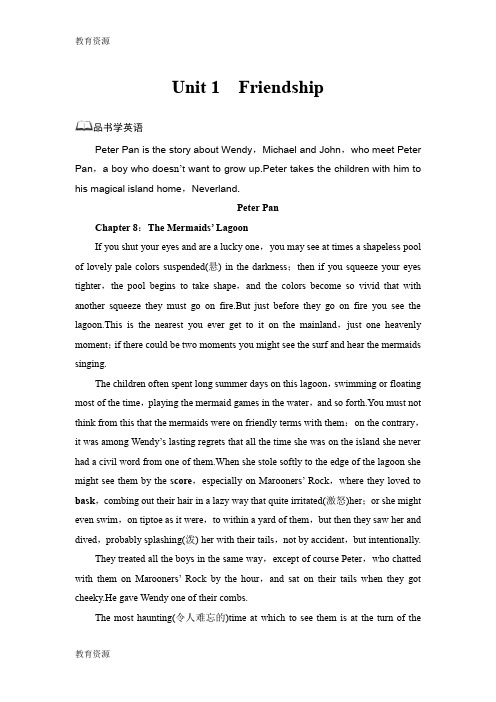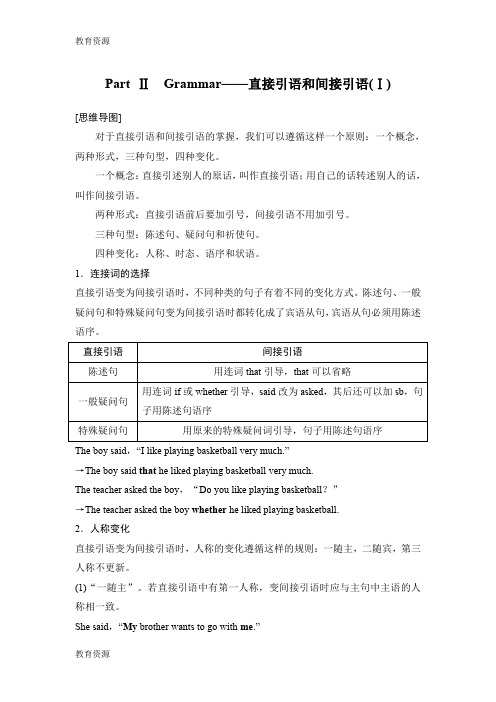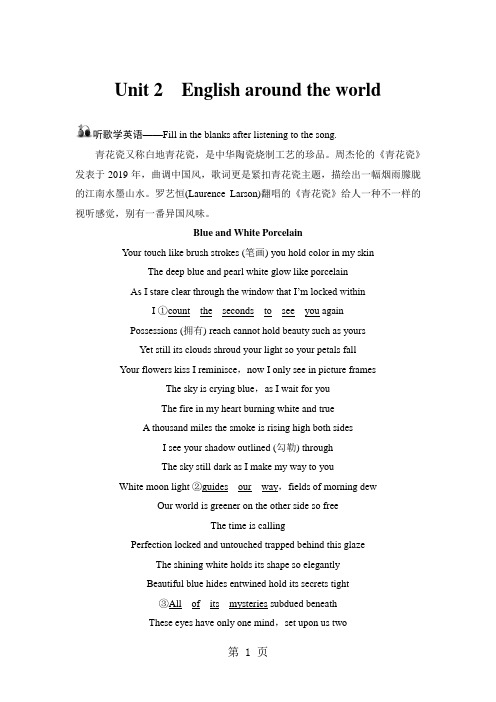英语高一、高二同步系列课堂讲义教版(通用)必修1Unit 3 Part Ⅱ
英语高一、高二同步系列课堂讲义教版(通用)必修1Unit 1 Part Ⅲ

Part ⅢLearning about Language &Using LanguageⅠ.重点单词1.highway n.公路;大路2.pack vi.&vt.捆扎;包装;打行李n.小包;包裹3.suitcase n.手提箱;衣箱4.overcoat n.大衣;外套5.teenager n.十几岁的青少年6.grateful adj.感激的;表示谢意的7.dislike n.&vt.不喜欢;厌恶8.tip n.提示;技巧;尖;尖端;小费vt.倾斜;翻倒9.swap vt.交换10.item n.项目;条款11.settle vi.安家;定居;停留vt.使定居;安排;解决→settler n.定居者;移民12.suffer vt.&vi.遭受;忍受;经历→suffering n.痛苦;苦难13.recover vi.&vt.痊愈;恢复;重新获得→recovery n.恢复;痊愈14.exactly adv.确实如此;正是;确切地→exact adj.确切的15.disagree vi.不同意→agree vi.同意Ⅱ.核心短语1.suffer__from遭受;患病2.get/be__tired__of 对……厌烦3.pack__(sth)__up 将(东西)装箱打包4.take__no__notice__of 未注意到||,不理睬5.be__worried__about 担心6.get along with 与……相处;进展7.fall in love 相爱;爱上8.join in 参加;加入9.make friends 交朋友10.communicate with... 与……交流Ⅲ.经典句式1.Mother asked her if/whether she was very hot with__so__many__clothes__on.妈妈问她穿这么多衣服是否很热||。
【教育资料】2018-2019版英语高一、高二同步系列课堂讲义教版(通用)必修1Unit 1 Part Ⅰ学习专用

Unit 1Friendship品书学英语Peter Pan is the story about Wendy,Michael and John,who meet Peter Pan,a boy who does n’t want to grow up.Peter takes the children with him to his magical island home,Neverland.Peter PanChapter 8:The Mermaids’ LagoonIf you shut your eyes and are a lucky one,you may see at times a shapeless pool of lovely pale colors suspended(悬) in the darkness;then if you squeeze your eyes tighter,the pool begins to take shape,and the colors become so vivid that with another squeeze they must go on fire.But just before they go on fire you see the lagoon.This is the nearest you ever get to it on the mainland,just one heavenly moment;if there could be two moments you might see the surf and hear the mermaids singing.The children often spent long summer days on this lagoon,swimming or floating most of the time,playing the mermaid games in the water,and so forth.You must not think from this that the mermaids were on friendly terms with them:on the contrary,it was among Wendy’s lasting regrets that all the time she was on the island she never had a civil word from one of them.When she stole softly to the edge of the lagoon she might see them by the score,especially on Marooners’ Rock,where they loved to bask,combing out their hair in a lazy way that quite irritated(激怒)her;or she might even swim,on tiptoe as it were,to within a yard of them,but then they saw her and dived,probably splashing(泼) her with their tails,not by accident,but intentionally.They treated all the boys in the same way,except of course Peter,who chatted with them on Marooners’ Rock by the hour,and sat on their tails when they got cheeky.He gave Wendy one of their combs.The most haunting(令人难忘的)time at which to see them is at the turn of themoon,when they utter(发出) strange wailing cries;but the lagoon is dangerous for mortals then.Wendy was often at the lagoon,however,on sunny days after rain,when the mermaids come up in extraordinary numbers to play with their bubbles.The bubbles of many colors made in rainbow water they treat as balls,hitting them gaily from one to another with their tails,and trying to keep them in the rainbow till they burst.The goals are at each end of the rainbow,and the keepers only are allowed to use their hands.Sometimes a dozen of these games will be going on in the lagoon at a time,and it is quite a pretty sight.Ⅰ.Circle the correct answer.1.What do the mermaids play with?A.Balls. B.Bubbles. C.The moon. D.Rocks. 2.Who do the mermaids talk to?A.Peter. B.Michael. C.Wendy. D.Everyone. 3.When do the mermaids utter wailing cries?A.At sunset. B.At midnight.C.At the turn of the moon. D.At sunrise.答案 1.B 2.A 3.CⅡ.Circle the correct meaning for each word.1.lagoonA.game B.waterfallC.a pond near the ocean D.desert island2.scoreA.large number B.sandy beachC.rocks D.rainbow3.baskA.swim B.talk quietlyC.eat fish D.lie in the sun答案 1.C 2.B 3.D导航知素养——A guide to the unitPart ⅠWarming Up & ReadingⅠ.重点单词1.dusk n.黄昏;傍晚2.loose adj.松的;松开的3.curtain n.窗帘;门帘;幕布4.thunder v i.打雷;雷鸣n.雷;雷声5.upset adj.心烦意乱的;不安的;不适的v t.使不安;使心烦6.calm v t.&v i.(使)平静;(使)镇定adj.平静的;镇静的;沉着的7.dusty adj.积满灰尘的→dust n.灰尘8.ignore v t.不理睬;忽视→ignorant adj.无知的;愚昧的9.outdoors ad v.在户外;在野外→indoors ad v.在户内;在室内10.entire adj.整个的;完全的;全部的→entirely ad v.完全地;全然地;整个地11.power n.能力;力量;权力→powerful adj.强大的;强有力的→powerless adj.无力的;没有能力的;无权力的12.concern v t.(使)担忧;涉及;关系到n.担心;关注;(利害)关系→concerned adj.有关的;忧虑的→concerning prep.关于Ⅱ.核心短语1.add__up合计;加起来2.calm__(...)__down (使)平静下来;(使)镇定下来3.have__got__to 不得不;必须4.be__concerned__about 关心;挂念5.go__through 经历;经受6.set__down 记下;放下;登记7.a series of 一连串的;一系列;一套8.on purpose 故意9.in order to 为了……10.at dusk 在黄昏时刻11.face to face 面对面地12.no longer/not...any longer 不再……Ⅲ.经典句式1.While__walking the dog,you were careless and it got loose and was hit by a car. 遛狗的时候,你不小心把狗松开了,它被车撞了。
英语高一、高二同步系列课堂讲义教版(通用)必修1Unit 1 Part Ⅰ

Unit 1Friendship品书学英语Peter Pan is the story about Wendy||,Michael and John||,who meet Peter Pan||,a boy who doesn’t want to grow up.Pete r takes the children with him to his magical island home||,Neverland.Peter PanChapter 8:The Mermaids’ LagoonIf you shut your eyes and are a lucky one||,you may see at times a shapeless pool of lovely pale colors suspended(悬) in the darkness;then if you squeeze your eyes tighter||,the pool begins to take shape||,and the colors become so vivid that with another squeeze they must go on fire.But just before they go on fire you see the lagoon.This is the nearest you ever get to it on the mainland||,just one heavenly moment;if there could be two moments you might see the surf and hear the mermaids singing.The children often spent long summer days on this lagoon||,swimming or floating most of the time||,playing the mermaid games in the water||,and so forth.Youmust not think from this that the mermaids were on friendly terms with them:on the contrary||,it was among Wendy’s lasting regrets that all the time she was on the island she never had a civil word from one of them.When she stole softly to the edge of the lagoon she might see them by the score||,especially on Marooners’ Rock||,where they loved to bask||,combing out their hair in a lazy way that quite irritated(激怒)her;or she might even swim||,on tiptoe as it were||,to within a yard of them||,but then they saw her and dived||,probably splashing(泼) her with their tails||,not by accident||,but intentionally.They treated all the boys in the same way||,except of course Peter||,who chatted with them on Marooners’ Rock by the hour||,and sat on their tails when they got cheeky.He gave Wendy one of their combs.The most haunting(令人难忘的)time at which to see them is at the turn of the moon||,when they utter(发出) strange wailing cries;but the lagoon is dangerous for mortals then.Wendy was often at the lagoon||,however||,on sunny days after rain||,when the mermaids come up in extraordinary numbers to play with their bubbles.The bubbles of many colors made in rainbow water they treat as balls||,hitting them gaily from one to another with their tails||,and trying to keep them in the rainbow till they burst.The goals are at each end of the rainbow||,and the keepers only are allowed to use their hands.Sometimes a dozen of these games will be going on in the lagoon at a time||,and it is quite a pretty sight.Ⅰ.Circle the correct answer.1.What do the mermaids play with?A.Balls. B.Bubbles. C.The moon. D.Rocks.2.Who do the mermaids talk to?A.Peter. B.Michael. C.Wendy. D.Everyone. 3.When do the mermaids utter wailing cries?A.At sunset. B.At midnight.C.At the turn of the moon. D.At sunrise.答案 1.B 2.A 3.CⅡ.Circle the correct meaning for each word.1.lagoonA.game B.waterfallC.a pond near the ocean D.desert island2.scoreA.large number B.sandy beachC.rocks D.rainbow3.baskA.swim B.talk quietlyC.eat fish D.lie in the sun答案 1.C 2.B 3.D导航知素养——A guide to the unitPart ⅠWarming Up & ReadingⅠ.重点单词1.dusk n.黄昏;傍晚2.loose adj.松的;松开的3.curtain n.窗帘;门帘;幕布4.thunder vi.打雷;雷鸣n.雷;雷声5.upset adj.心烦意乱的;不安的;不适的vt.使不安;使心烦6.calm vt.&vi.(使)平静;(使)镇定adj.平静的;镇静的;沉着的7.dusty adj.积满灰尘的→dust n.灰尘8.ignore vt.不理睬;忽视→ignorant adj.无知的;愚昧的9.outdoors adv.在户外;在野外→indoors adv.在户内;在室内10.entire adj.整个的;完全的;全部的→entirely adv.完全地;全然地;整个地11.power n.能力;力量;权力→powerful adj.强大的;强有力的→powerless adj.无力的;没有能力的;无权力的12.concern vt.(使)担忧;涉及;关系到n.担心;关注;(利害)关系→concerned adj.有关的;忧虑的→concerning prep.关于Ⅱ.核心短语1.add__up合计;加起来2.calm__(...)__down (使)平静下来;(使)镇定下来3.have__got__to 不得不;必须4.be__concerned__about 关心;挂念5.go__through 经历;经受6.set__down 记下;放下;登记7.a series of 一连串的;一系列;一套8.on purpose 故意9.in order to 为了……10.at dusk 在黄昏时刻11.face to face 面对面地12.no longer/not...any longer 不再……Ⅲ.经典句式1.While__walking the dog||,you were careless and it got loose and was hit by a car. 遛狗的时候||,你不小心把狗松开了||,它被车撞了||。
2018-2019版英语高一、高二同步系列课堂讲义教版(通用)必修1Unit 3 Part Ⅳ

Part ⅣWriting——电子邮件电子邮件(email)与一般信件一样,包括开头、正文和结尾部分。
它具有阅读方便、传递快捷以及内容简短的特点。
1.必须在“收件人(To)”框中输入收件人的e-mail地址,如Jim1992@ 。
“主题(Subject)”框最好不要空着,它应该是邮件内容的简明概括。
2.e-mail正文前的称呼。
在同辈的亲朋好友或同事间可以直呼其姓,如Prof.Smith。
写电子邮件要直接,并多用短句,以使意思清楚。
3.根据邮件正式与否选择合适的结尾。
与书面信函不同的是,e-mail的结尾可以不署名,尤其是给朋友、同学等熟人时,同时无须写出时间;邮件末尾客套用语通常也只需要一两个词,如Thank,Best wishes等。
假如你是新华中学的学生李华,你的美国朋友杰克在给你的电子邮件中询问中国人在生活中使用手机的情况,请你给他回一封电子邮件。
内容包括:1.中国人使用手机的情况;2.过度使用手机带来的问题;3.你的建议。
注意:1.词数100左右;2.可以适当增加细节,以使行文连贯。
Dear Jack,Thank you for your e-mail.Now let me tell you something about the cell phone using in China.Yours,Li Hua[词汇搜索]1.手机使用the__cell__phone__using2.随着……的发展with__the__development__of...3.在我们的日常生活中in__our__daily__life4.与……联系get__in__touch__with...5.上网__surf__the__Internet6.总之in__a__word7.一方面……,另一方面……for__one__thing...,for__another...8.导致麻烦cause__trouble[由词连句]1.随着手机技术的发展,手机在中国越来越常见了。
2018-2019版英语高一、高二同步系列课堂讲义教版Unit 3 Part Ⅱ

Part ⅡGrammar——过去分词作状语[思维导图]一、过去分词作状语的类型过去分词作状语,可以表示时间、让步、条件、原因、方式等,相当于一个状语从句。
其逻辑主语为主句的主语,且与主句主语构成逻辑上的被动关系。
1.作时间状语相当于时间状语从句。
可在过去分词前加上连词“when,while,until”等,使其时间意义更明确。
Seen from the top of the hill,the town looks more beautiful.=When the town is seen from the top of the hill,it looks more beautiful.=When seen from the top of the hill,the town looks more beautiful.从山顶往下看,这座城镇看起来更加漂亮。
When asked for his views about his teaching job,he said he found it very interesting and rewarding.当问到对教学工作的观点时,他说他觉得既有趣又有意义。
2.作原因状语相当于原因状语从句。
Satisfied with what I did,my teacher praised me in class.=Because my teacher was satisfied with what I did,he praised me in class.由于对我所做的事情感到满意,老师在班上表扬了我。
3.作条件状语相当于条件状语从句。
可加连词if,unless等转换成条件状语从句。
Grown in rich soil,these seeds can grow fast.=If they are grown in rich soil,these seeds can grow fast.如果种在肥沃的土壤里,这些种子就能长得快。
【教育资料】2018-2019版英语高一、高二同步系列课堂讲义教版(通用)必修1Unit 1 Part Ⅱ学习专用

Part ⅡGrammar——直接引语和间接引语(Ⅰ)[思维导图]对于直接引语和间接引语的掌握,我们可以遵循这样一个原则:一个概念,两种形式,三种句型,四种变化。
一个概念:直接引述别人的原话,叫作直接引语;用自己的话转述别人的话,叫作间接引语。
两种形式:直接引语前后要加引号,间接引语不用加引号。
三种句型:陈述句、疑问句和祈使句。
四种变化:人称、时态、语序和状语。
1.连接词的选择直接引语变为间接引语时,不同种类的句子有着不同的变化方式。
陈述句、一般疑问句和特殊疑问句变为间接引语时都转化成了宾语从句,宾语从句必须用陈述语序。
The boy said,“I like playing basketball very much.”→The boy said that he liked playing basketball very much.The teacher asked the boy,“Do you like playing basketball?”→The teacher asked the boy whether he liked playing basketball.2.人称变化直接引语变为间接引语时,人称的变化遵循这样的规则:一随主,二随宾,第三人称不更新。
(1)“一随主”。
若直接引语中有第一人称,变间接引语时应与主句中主语的人称相一致。
She said,“My brother wants to go with me.”→She said her brother wanted to go with her.(2)“二随宾”。
若直接引语中有第二人称,变间接引语时应与主句中宾语的人称相一致。
She said to me,“You had better get there early.”→She told me that I had better get there early.(3)“第三人称不更新”。
版英语高一高二同步系列课堂讲义教版UnitPart Ⅰ

U n i t4M a k i n g t h e n e w s 与传统媒体相比,互联网作为一种新的媒体形式存在着可信度不高的劣势,但它发展迅猛,前途无量。
AlthoughtheInternetisrelativelynewtothemodernworld,ithasrapidlybecomepartofourdailylife.Ithasbecomeoneofthemajormediaofcommunicationandnewsresourcesint oda y’s society.I t’s notasurprisethatthisinfantmediumwouldsoon taketheplaceof thetraditionalsourcesfornews.But,cansomethingsonewbetrusted?Inamediumwhereanyonecancreateawebpage,nooneknowswhichnewsis fake andwhichnewsisreal.Atleastwithnewspapers,wehaveour established names.Andevenwithtelevision,wethinkwecantrustournightlynewsreportonthenationaltelevisionstations.Still,studiesshowthattheInternetstillisamain,ifnotthemostsignificantsourcefornews.TheInternetbeganasaconnectionofafewgovernmentcomputersusedmainlyformilitary(军事的)purposes.Then,verybasicthingsbegantogrowoutofit:suchas download areasandsimplee-mail.WiththecreationofHTMLwhichcouldletyoujumpfromsitetositethroughlinks,“webbrowsers(浏览器)”werecreated.Thencamethefirstwebpagesandthefirstbitsofnewswhetherthenewswaspersonal,localornational.Theevolutionofonlinenewswas n’t slow.Infact,mostofthegrowthtookplacewithinasingleyear.WiththequickandrecentinfluenceoftheInternet,itbecomesdifficulttodifferentiatebetweenthemoreestablishednewssourcesandtheonlinemedium.Weknowwecan trustsiteslikeMSNBCbecausetheyhaveanestablishednamealreadyintelevisionnews.But,withjournalistslikeMikeDrudge(whobroketheMonicaLewinksyscandal),hissitehasbeenconsideredmoreofa“rumorcenter”thanasourceforlegitimatenews.Yetthisdoesnot preventpeoplef romusing thesites,asnewswebsitesofferthequickest,ersneedtobecarefulaboutwhichsourcestheycanreallytrust,personalpagesor professional ones.词海拾贝1.taketheplaceof代替2.fake adj. 假的3.establish v. 建立4.download v. 下载5.preventsbfromdoingsth 阻止某人做某事6.professional adj. 专业的PartⅠWarmingUp&ReadingⅠ.重点单词1.update v t.更新;使现代化2.acquire v t.获得;取得;学到3.assess v t.评估;评定4.meanwhile ad v.其间;同时5.case n.情况;病例;案例6.accuse v t.指责;谴责;控告7.deliberately ad v.故意地8.dilemma n.(进退两难的)困境;窘境9.demand n.需求;要求v t.强烈要求10.publish v t.出版;发行;发表;公布11.thorough adj.彻底的;详尽的12.gifted adj.有天赋的→gift n.天赋;礼物13.delighted adj.快乐的;欣喜的→delight v t.使高兴→delightful adj.令人愉快的14.admirable adj.值得赞扬的;令人钦佩的→admire v t.钦佩→admiration n.钦佩15.assist v t.帮助;协助;援助→assistant n.助手;助理;售货员→assistance n.帮助;协助16.profession n.职业;专业→professional adj.专业的;职业的n.专业人员17.concentrate v i.&v t.集中;聚集→concentration n.专心rm v t.告知;通知→information n.信息19.guilty adj.犯罪的;有罪的;内疚的→guilt n.负罪感20.technical adj.技术(上)的;技巧方面的→technically ad v.技术上;工艺上21.photograph n.照片v t.给……照相→photographer n.摄影师→photography n.摄影22.unusual adj.不同寻常的;独特的→usual adj.寻常的Ⅱ.核心短语1.concentrate__on集中;全神贯注于2.have__a__nose__for 对……敏感rm__sb__of/about__sth__ 通知某人某事4.keep__in__mind 记在心头5.dependon/upon 依靠;依赖6.accuse...of 因……指责或控告……7.soasto(dosth) 为了(做)……8.lookforwardto 盼望;期望Ⅲ.经典句式1.Never__will__Zhou__Yang__(ZY)__forgethisfirstassignmentattheofficeofapopularEnglishnewspaper.周阳永远不会忘记他在一家受欢迎的英文报社上班时的第一项工作任务。
2018-2019版英语高一、高二同步系列课堂讲义教版(通用)必修1Unit 5 Part Ⅱ

Part ⅡGrammar——定语从句(Ⅱ)[思维导图]一、关系副词引导的定语从句1.when表示时间,引导的从句修饰时间名词,在定语从句中作时间状语。
I’ll never forget the time when we worked on the farm.我将永远不会忘记我们在农场工作的时光。
2.where表示地点,引导的从句修饰地点名词,where在定语从句中作地点状语。
The hotel where we stayed was very clean.我们住的那个旅馆很干净。
3.why表示原因,其先行词一般是reason,在定语从句中作原因状语。
The reason why he was late was that he missed his train.他迟到的原因是他错过了火车。
二、“介词+关系代词”引导的定语从句当关系代词在定语从句中作介词的宾语时,我们通常用“介词+关系代词”引导定语从句。
如果指“人”,用“介词+whom”;如果指“物”,用“介词+which”;关系代词有时也用whose(作定语)。
选用介词的依据:1.根据定语从句中谓语动词的搭配习惯(即固定短语)。
Yesterday we visited the West Lake for which Hangzhou is famous.昨天我们参观了西湖,杭州因其而出名。
(be famous for“因……而出名”) 2.根据先行词的搭配习惯(约定俗成,不一定是短语)。
This is the camera with which he often takes photos.这就是他经常用来拍照的相机。
(with camera“用照相机”)The boss in whose company Mr King worked heard about the accident.金先生所工作的公司的老板听到了这起事故。
(in the boss’ company)3.根据句子的意思来选择。
英语高一、高二同步系列课堂讲义教版(通用)必修1Unit 2 Part Ⅲ

你能从《阅读》中找到下面这些“命令”和“要求”吗? 3._T_h_i_s_i_s_b_e_c_a_u_s_e_ in the early days of radio,those who reported the news were
○21
dialects are spoken.Although many Americans move a lot,they still recognize and
understand each other’s dialects.
13
课前预习
语言输入
阅读清障
①standard adj.标准的;通常的;普通的 n.标准,水平;规范,规格
②believe it or not信不信由你 ③such adj.那样的;这样的 ④as表示“像……一样” ⑤on TV在电视上 ※过去分词短语作后置定语,修饰the English。 ※who引导定语从句,修饰先行词those。 ⑥expect vt.盼望;预期;预料
14
课前预习
语言输入
⑦however adv.然而;无论如何 ※people speak为定语从句,修饰the way。引导词that/in which在从句中作状语,且已省 略。 ⑧expression /Ik'spreʃn/ n.词语;表示;表达 ※when 引 导 时 间 状 语 从 句 , 形 容 词 短 语 作 后 置 定 语 , 修 饰 其 前 面 的 words and expressions。 ⑨dialect /'daIəlekt/ n.方言 ⑩midwestern /mId'westən/ adj.中西部的 ⑪southern adj.南方的;南部的 ⑫African /'æ frIkən/ adj.非洲的;非洲人的;非洲语言的
英语高一、高二同步系列课堂讲义教版(通用)必修1Unit 4 Part Ⅰ

Unit 4Earthquakes品书学英语This masterpiece by the author of the Jungle Books is full of language thatevokes Africa—the banks of the great grey-green||,greasy Limpopo River||,all set about with fever-trees.At times it is almost like a poem by Edward Lear.It is one of our favourite stories.The Elephant’s ChildLong||,long ago||,the mighty Elephant had no trunk.His nose was short||,and only as big as a boot!But the Elephant’s child||,just a baby Elephant||,was very curious and always asked silly questions:“Aunt Ostrich||,why do your tail feathers grow so tall?...Uncle Giraffe||,what makes your skin so spotty?...Miss Hippo||,how does your mouth open so wide?”One fine morning the curious baby Elephant asked||,“What does the Crocodile have for dinner?”All together everybody yelled||,“HUSH!”in a dreadful tone||,and they shushed and shooed him away angrily.But the baby Elephant did not understandwhy.He was still curious!Then the baby Elephant came upon the magnificent Kolokolo bird and he sighed||,“My family has shushed and shooed me away||,but I still want to know what the Crocodile eats for dinner!”The Kolokolo Bird answered||,sadly||,“Go to the banks of the great green river if you want to find out.”After a long and tiresome search||,the baby Elephant found the Crocodile by the river bank.“I have been looking for you||,Mr.Crocodile!”he said with excitement||,“Will you please tell me what you have for dinner?”The Crocodile grinned wide||,and he said||,“Come cl oser||,baby Elephant||,I’ll whisper it to you.”The baby Elephant bent his head down to the Crocodile’s large||,toothy mouth.“I think||,”growled the Crocodile||,“Today I will begin with a baby Elephant!”And suddenly the Crocodile caught him by his little nose.The baby Elephant cried out through his pinched nose||,“Led go!You’re hurdig be!”Stubbornly||,he sat back and began to pull as hard as he could.As he pulled||,and leaned back||,his nose began to stretch!They both pulled and pulled until the baby Elephan t’s nose was almost five feet long.Finally the Crocodile let go of his nose with a plop.The poor baby Elephant was left with a very sore and very long nose!At first||,all the animals made fun of his great||,ugly nose.But then he found many uses for it.He could pick fruit from high treetops||,brush away flies||,and even breathe when he was underwater!And that is how the Elephant got his trunk.What Do You Think?1.Why did everyone tell the baby Elephant to be quiet?A.They wanted to sleep.B.They were afraid the Crocodile would hear him.C.They were tired of him asking so many questions.D.They wanted to talk to each other.2.Why was the Kolokolo bird sad when he told the baby Elephant to go to the river? A.He was having a bad day.B.All Kolokolo birds are sad.C.He was tired of answering questions.D.He knew that the Crocodile might try to eat the baby Elephant.3.According to the story||,after the baby Elephant’s nose was stretched||,what could he do?A.Pick fruit||,brush away flies and breathe underwater.B.Catch the Kolokolo bird.C.Blow water on Aunt Ostrich.D.Cover his eyes with his nose.答案 1.C 2.D 3.A导航知素养——A guide to the unitPart ⅠWarming Up & ReadingⅠ.重点单词1.burst vi.爆裂;爆发n.突然破裂2.ruin n.废墟;毁灭vt.毁灭;使破产3.destroy vt.毁坏;破坏;消灭4.rescue vt.& n.救援;营救5.trap vt.使陷入困境n.陷阱;困境6.disaster n.灾难;灾祸7.bury vt.埋葬;掩埋;隐藏8.shelter n.掩蔽处;避身处;掩蔽9.reporter n.记者10.suffering n.苦难;痛苦→suffer v.遭受11.earthquake n.地震→quake n.地震;震动12.injure vt.损害;伤害→injury n.伤害;侮辱13.extreme adj.极度的→extremely adv.极端地;很;非常地14.nation n.民族;国家;国民→national adj.国家的;全国性的15.useless adj.无用的;无效的;无益的→useful adj.有用的→use n.用途16.shock v.(使)震惊;震动→shocked adj.震惊的;震撼的→shocking adj.令人震惊的Ⅱ.核心短语1.right__away立刻;马上2.think__little__of 不在意;看轻3.as__if 仿佛;好像4.at__an__end 结束;终结5.in ruins 严重受损;破败不堪6.dig out 掘出;发现7.a (great) number of 许多;大量的Ⅲ.经典句式1.In the farmyards||,the chickens and even the pigs were too__nervous__to__eat.在农家小院里的鸡||,甚至猪都害怕得不吃东西||。
2018-2019版英语高一、高二同步系列课堂讲义教版(通用)必修1Unit 3 单元加餐练

2018-2019版英语高一、高二同步系列课堂讲义教版(通用)必修1Unit 3 单元加餐练3.Tomorrow will__be (be) my father’s birthday.4.I think Mr.Li is__leaving (leave) here for Beijing to attend a meeting in two days.5.Usually the new term starts (start) on August 29th.6.Tom,Mr.White is__leaving (leave).Will you please show him out? 7.—Did you tell Julia about the result?—Oh,no,I forgot.I will__call (call) her now.8.You are to__hand (hand) in your compositions after class.9.“The moment is__coming (come) soon,”he thought to himself,waiting nervously.10.Because the shop is__closing (close) down,everything is sold at half price. Ⅴ.微写作根据要求运用本单元所学知识完成下面小作文,并背诵成文。
1.我喜欢旅游。
(be fond of)2.自从大学毕业,我一直梦想周游世界。
(ever since, graduate, dream about) 3.我是一个坚定的人,有时也很固执。
(determined, stubborn)4.一旦我决定了做什么事,就没有什么能改变。
(make up one’s mind)5.最后,经过精心组织,我找到了旅游的最佳办法——骑自行车旅行。
2018-2019版英语高一、高二同步系列课堂讲义教版(通用)必修1Unit 4 Part Ⅱ

2018-2019版英语高一、高二同步系列课堂讲义教版(通用)必修1Unit 4 Part Ⅱ在书店里跟我说话的那位妇女以前住在隔壁。
6.as用作关系代词,既可指人,也可指物。
在定语从句中可作主语、宾语和表语。
它常用在the same...as...,such...as...,as...as...,so...as...等结构中,as不能省略,此时为限制性定语从句。
另外,as还可引导非限制性定语从句,在定语从句中作主语、表语或宾语,解释说明整个句子,一般放在主句之前。
I want to have such a computer as he has.我想有一台和他(的电脑)一样的电脑。
As we all know,China has a large population.众所周知,中国人口众多。
三、定语从句中需注意的事项1.只用that不用which的情况(1)当先行词是all,much,anything,everything,nothing,little,none等不定代词时。
She told me everything that she knew.她把她知道的一切都告诉了我。
(2)当先行词为序数词或被序数词修饰,或先行词为形容词最高级或被形容词最高级修饰时。
The first place that they visited in Guilin was Elephant Trunk Hill.在桂林他们参观的第一个地方是象鼻山。
(3)先行词被the only,the very,the right,the last等修饰时。
This is the very book that I left on the playground last week.这就是上个星期我落在操场上的那本书。
(4)先行词既有人又有物时。
He talked happily of the things and persons that he remembered studying in the school.他高兴地谈论着在这所学校上学时所记得的人和事。
2021-2022版英语高一、高二同步系列课堂讲义教版(通用)必修1Unit 2 Part Ⅳ

[由词连句] 1.我们想提高我们的英语口语。
We want to improve our spoken English.
(want to do...)
2.我们要为全校学生举行英语演讲比赛。 We are going to have an English-speaking contest for all the students of our school.
(be going to)
7
3.比赛将于十月九日晚七点至九点在学校大会议室举行。 The contest will be held from 7:00 p.m.to 9:00 p.m. on Oct.9 in our school meeting hall. (一般将来时的被动语态)
8
4.想参加比赛的学生在九月三十日之前到学生会办公室报名。 The students who want to take part in the contest should come to sign up at the office of the Students’ Union before Sept.30. (定语从句;sign up)
Part Ⅳ Writing——英文海报
1
英文海报通常含有通知性,所以主题应该明确,一目了然。它还包含广告的某些特 点,要求内容简明扼要,形式新颖美观。 [基本框架] 1.标题
首先根据海报的特点、格式写明标题。海报中往往把内容作为大标题。例如: Football Match,Why is it important to learn English?或者注明Poster等字样。
2
2.正文部分 不同的海报其正文部分的侧重点不同。对于介绍性的海报,首先引出话题,其次 列出原因,最后总结。对于宣传类的海报,要写清楚具体内容,如:活动内容、 地点以及参加规定、主持或举办单位等。
英语高一、高二同步系列课堂讲义教版(通用)必修1Unit 4 Part Ⅲ

Part ⅢLearning about Language &Using LanguageⅠ.重点单词1.bar n.条;棒;条状物2.damage n.&vt.损失;损害3.sincerely adv.真诚地;真挚地4.express vt.表达;表示n.快车;速递5.outline n.要点;大纲;轮廓6.headline n.报刊的大字标题7.cyclist n.骑自行车的人→cycle vi.骑自行车8.congratulation n.祝贺;(复数)贺词→congratu late vt.祝贺;恭喜;庆贺9.judge vt.断定;判断;判决n.裁判员;法官→judgment n.审判;判决;裁判;判断10.frighten vt.使惊吓;吓唬→frightened adj.受惊的;受恐吓的→frightening adj.令人恐惧的Ⅱ.核心短语1.of__no__use没有用2.give__out 发生||,散发(热、光等);用完;耗尽3.refer__to 参考;涉及;提到4.give/make__a__speech 发表演说5.be__pleased__to__do__sth 很高兴地做某事6.be proud of 为……而自豪||,以……为荣7.compare with 和……相比||,和……比起来8.wake up 醒来9.raise/collect money for 为……筹钱Ⅲ.经典句式1.Here__are__my__neighbours whose home was destroyed by the earthquake.这就是我的邻居们||,他们的家被地震毁掉了||。
2.Your speech was heard by a group of five judges||,all__of__whom agreed that it was the best one this year.评委会的五位评委听了你的演讲||,他们一致认为这是今年最好的||。
2018-2019版英语高一、高二同步系列课堂讲义教版(通用)必修1Unit 2 Part Ⅲ

课前预习 语言输入
⑬Spanish /'spænIʃ/ adj.西班牙的;西班牙人的;西班牙语的 n.西班牙人;西班牙语
⑭neighbouring adj.附近的;毗邻的(只作前置定语) ⑮all over遍及;到处 ※because引导原因状语从句。 ⑯play a part (in)扮演一个角色;参与 ⑰eastern /'iːstən/ adj.东方的;东部的
straight 9.____________ adv.直接;挺直 adj.直的;笔直的;正直的 block 10.____________ n.街区;块;木块;石块 expression n.词语;表示;表达→express v.表达;表示 11.____________
recognize vt.辨认出;承认;公认→recognition n.认出;承认 12.____________
⑤on TV在电视上
※过去分词短语作后置定语,修饰the English。 ※who引导定语从句,修饰先行词those。 ⑥expect vt.盼望;预期;预料
13
课前预习
语言输入
⑦however adv.然而;无论如何
※people speak为定语从句,修饰the way。引导词that/in which在从句中作状语,且已省
Байду номын сангаас
※who引导定语从句,从句修饰先行词some people。
※when引导时间状语从句。 ⑱southeastern /ˌsaʊθ 'iːstən/ adj.东南方的;来自东南的
15
课前预习
语言输入
⑲the same...as...和……一样的…… ⑳northwestern /'nɔːθ'westən/ adj.西北方的;来自西北的 ※in which 引导定语从句,从句修饰 a large country。 ※although 引导让步状语从句。 21 recognize /'rekəɡnaIz/ vt.辨认出;承认 ○
2018-2019版英语高一、高二同步系列课堂讲义教版(通用)必修1Unit 2 Part Ⅰ

Unit 2English around the world听歌学英语——Fill in the blanks after listening to the song.青花瓷又称白地青花瓷,是中华陶瓷烧制工艺的珍品。
周杰伦的《青花瓷》发表于2019年,曲调中国风,歌词更是紧扣青花瓷主题,描绘出一幅烟雨朦胧的江南水墨山水。
罗艺恒(Laurence Larson)翻唱的《青花瓷》给人一种不一样的视听感觉,别有一番异国风味。
Blue and White PorcelainYour touch like brush strokes (笔画) you hold color in my skinThe deep blue and pearl white glow like porcelainAs I stare clear through the window that I’m locked withinI ①count__the__seconds__to__see__you againPossessions (拥有) reach cannot hold beauty such as yoursYet still its clouds shroud your light so your petals fallYour flowers kiss I reminisce,now I only see in picture framesThe sky is crying blue,as I wait for youThe fire in my heart burning white and trueA thousand miles the smoke is rising high both sidesI see your shadow outlined (勾勒) throughThe sky still dark as I make my way to youWhite moon light ②guides__our__way,fields of morning dewOur world is greener on the other side so freeThe time is callingPerfection locked and untouched trapped behind this glazeThe shining white holds its shape so elegantlyBeautiful blue hides entwined hold its secrets tight③All__of__its__mysteries subdued beneathThese eyes have only one mind,set upon us twoMy present,past and the future reside in you Although the ink has come to fade④Its__art__and__meaning still remainRepeat★青花瓷你的爱抚宛如你执手画笔勾勒我肌肤色彩你如传世的青花瓷自顾自美丽凝视冉冉檀香透过窗心事我了然我细数时光只为再与你相见你的美恍若一缕飘散去到我去不了的地方你嫣然的一笑如含苞待放记忆中你淡香亲吻恍若依稀只见于画纸天青色等烟雨而我在等你心中莫名燃起白亮光影炊烟袅袅升起隔江千万里你从墨色深处被隐去天际依然漆黑如墨我自顾自走向你月色被打捞起晕开了结局恍若置身另个自由世界似水流年却是如歌隐藏在窑烧里千年的秘密自然落了锁光晕的白悠然现于碗底澄明的蓝交织勾错迷藏的秘密所有神秘都将藏于瓷底眼眸和真心全为你我设定我的结局全由你决定即便墨色晕染淡去依旧是亘古的艺术品★重复导航知素养——A guide to the unit主题语境人与自我生活与学习(The road tomodern English)语言学习的规律、方法等生活与学习(StandardEnglish and dialects)语言学习的规律、方法等语言知识(1)语音:掌握重音、语调、节奏等的变化,表达意义、意图和态度等。
- 1、下载文档前请自行甄别文档内容的完整性,平台不提供额外的编辑、内容补充、找答案等附加服务。
- 2、"仅部分预览"的文档,不可在线预览部分如存在完整性等问题,可反馈申请退款(可完整预览的文档不适用该条件!)。
- 3、如文档侵犯您的权益,请联系客服反馈,我们会尽快为您处理(人工客服工作时间:9:00-18:30)。
Part ⅡGrammar——现在进行时表将来[思维导图]
一、现在进行时表示将来
现在进行时可以表示将来||,常含有“意图”“安排”或“打算”的含义||,这种用法可以使句子更加生动||,给人一种期待感||。
具体用法如下:
1.常表示最近或较近的将来||,所用动词多是表示位置转移的动词||,但偶尔也表示较远的将来||。
I’m meeting you after class.下课后我找你||。
2.表示将来的现在进行时有时含有“决心”的意思||,多用在否定结构中||,有时也用在肯定结构中||。
I’m not waiting any longer.我不再等了||。
3.现在进行时也可在时间、条件或原因状语从句中表示将来||。
When you are passing by my front door||,please drop in.
你什么时候路过我家||,请进来坐||。
(时间状语从句)
4.不是所有的动词都可以用进行时态表将来||,只有表示具体位置移动意义的动词及少部分其他意义的动词才可以用进行时态表将来||。
此类动词(词组)如下:arrive||,begin||,come||,die||,go||,leave||,end||,return||,start||,travel||,fly||,stop||,close||,drive||,fall||,remain||,stay||,move||,land||,leave for||,take off||,see...off等||。
Hurry up.The plane is taking off soon.
快点||。
飞机马上就要起飞了||。
二、其他几种表示将来的结构
1.will/shall do表达单纯的将来时||,是对未来事情发生的一种“预见性”||。
可用于说话时才想到或决定的事||。
will用于各种人称||,而shall仅用于第一人称||。
—I’m sorry.I forgot to post the letter for you.
—Never mind.I will post it myself this afternoon.
——对不起||,我忘了给你寄信了||。
——不要紧||,今天下午我自己去寄||。
2.be going to do用来表示近期或事先考虑要做的事情||,以及有迹象表明将要发生的事||。
Look at those black clouds;there’s going to be a storm.
瞧那些乌云||,眼看要有暴风雨了||。
3.be to do表示预定、按计划或安排将要发生的动作||。
The meeting is to take place early tomorrow.
会议明天一早召开||。
4.be about to do表示马上就要发生的事||,不与具体的时间状语连用||,但可用于句型be about to do...when...“即将做某事就在这时……”||。
Be quiet!The film is about to start.
安静!电影马上开始了||。
5.一般现在时可表示按时刻表、日程表的安排所发生的将来的动作||,也可用于状语从句中表示将来||。
The next plane leaves at 6 pm.
下一班航班晚上6点起飞||。
Ⅰ.用所给动词的正确形式填空
1.The students are__playing(play) football in the park at the moment.
2.You are always doing(do) well.
3.—When are you going(go) off to Guangzhou?
—Next Friday morning.
4.Whenever I visit him||,he is__working(work) in his lab.
5.I hear all the hotels are very crowded.Where are you staying(stay) in Shanghai? 6.It is half past eight now||,but they are still having(have) their supper at home. 7.Ladies and gentlemen||,please fasten your seat belts.The plane is__taking(take) off.
8.Our train leaves (leave) an hour later||,so we don’t have to hurry.
Ⅱ.单句改错(每小题仅有1处错误)
1.She is about to leave when some guests came.is→was
2.If you will visit him||,I will go with you.去掉第一个will
3.The bus leave at 6:00.leave→leaves
4.I was seeing him off this afternoon.was→am
5.The meeting is take place next Monday.is后加to
Ⅲ.补全句子
1.I’ll call on some of my old friends while I__am__staying__in__Shanghai (待在上海).
2.Catherine is__waiting__for__you (正在等你) downstairs at the moment. 3.When are__you__leaving__for (你动身去) that mountain village for a friendly visit?
4.Technology is__changing (不断变化) so rapidly that we have to work hard to keep up with it.
5.I was__about__to__go__out (正要出去) when my uncle arrived.
6.They are__taking__their__children (将带孩子们) to the zoo this Sunday.
7.If he is__doing__an__experiment (正在做实验) when you arrive||,don’t disturb him.
8.The plane to London takes__off (起飞) at 5:48 in the morning.Please get up early tomorrow morning.。
